- Details
- Category: Industry News
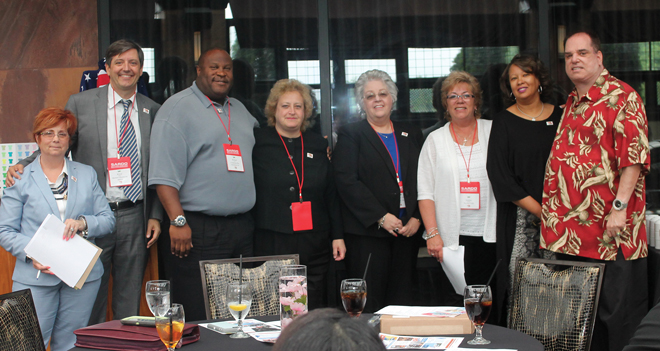 MLA’s board of directors (L to R): Executive Administrator Mary Presley, board member Bryan Johnson of Martens Johnson Insurance Agency, Vice President Michael Greene of A Platinum Plus Limo, Secretary/Membership Chair Kim Klein of Lasting Impressions Limousine & DJ Services, Treasurer Linda Lee Jones of The Franklin Chauffeur, President Joanna Fridinger of The Limo Lady, and board members Kim Little of First Choice Transportation and Gary Day of American Limousines
Hanover, Md. — When Maryland Limousine Association (MLA) hosted nearly 50 members and supporters on June 21 at Maryland Live! Casino’s Prime Rib, it was the first time in more than a year that the association held a meeting. CD Editor Madeleine Maccar was among those who attended the meeting.
MLA’s board of directors (L to R): Executive Administrator Mary Presley, board member Bryan Johnson of Martens Johnson Insurance Agency, Vice President Michael Greene of A Platinum Plus Limo, Secretary/Membership Chair Kim Klein of Lasting Impressions Limousine & DJ Services, Treasurer Linda Lee Jones of The Franklin Chauffeur, President Joanna Fridinger of The Limo Lady, and board members Kim Little of First Choice Transportation and Gary Day of American Limousines
Hanover, Md. — When Maryland Limousine Association (MLA) hosted nearly 50 members and supporters on June 21 at Maryland Live! Casino’s Prime Rib, it was the first time in more than a year that the association held a meeting. CD Editor Madeleine Maccar was among those who attended the meeting.
MLA had gone quiet for most of 2015, largely owing to TNCs forcing local operators to refocus on keeping their businesses afloat and leaving the association no choice but to fall by the wayside. But longtime President Joanna Fridinger of The Limo Lady was determined to breathe new life into it, starting with the help of its newly named Executive Administrator Mary Presley “to help keep the MLA alive,” as Presley holds the same position with several motorcoach associations and the similarly revived Washington Metropolitan Limousine Association (WMLA). Fridinger introduced MLA’s new EA after expressing her gratitude to everyone for the packed-room turnout.
“Thank you for your support as we try to get rejuvenated,” Fridinger said to those in attendance. “We will continue to hold meetings; we need to be a team of vendors and operators. We’re all here for the same reason: to make the industry stronger not as individual companies, not as competitors, but as one association.”
The meeting also saw the introduction of MLA’s board, which convened immediately before the membership meeting and comprises:
President: Joanna Fridinger of The Limo Lady
Vice President: Michael Greene of A Platinum Plus Limo
Secretary and Membership Chair: Kim Klein of Lasting Impressions Limousine & DJ Services
Treasurer: Linda Lee Jones of The Franklin Chauffeur
Board members: Gary Day of American Limousine, Bryan Johnson of Martens Johnson Insurance Agency, and Kim Little of First Choice Transportation
Executive Administrator: Mary Presley
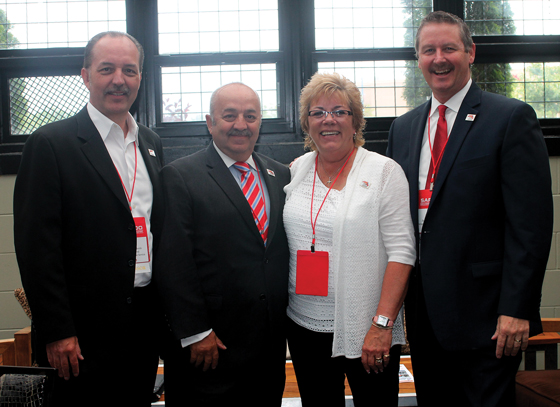 MLA President Joanna Fridinger of The Limo Lady with (L to R) Mert Onal, Korky Onal, and George Rains of ZBest Worldwide Chauffeured Transportation
As MLA’s coffers need to be refilled, fundraising ventures are on the horizon. Ideas ranging from a golf outing to a “roadeo”—an idea inspired by Presely’s motorocoach experience, where obstacle courses would be set up in an empty parking lot for larger vehicles to compete in—were suggested as ways to get the association involved in a light-hearted event to raise money for the association.
MLA President Joanna Fridinger of The Limo Lady with (L to R) Mert Onal, Korky Onal, and George Rains of ZBest Worldwide Chauffeured Transportation
As MLA’s coffers need to be refilled, fundraising ventures are on the horizon. Ideas ranging from a golf outing to a “roadeo”—an idea inspired by Presely’s motorocoach experience, where obstacle courses would be set up in an empty parking lot for larger vehicles to compete in—were suggested as ways to get the association involved in a light-hearted event to raise money for the association.
After association-specific updates were dispensed with, the afternoon’s slate of speakers were up, starting with Quang Ngo and Trang Li of NT Souvenir Wholesale, one of the highest-rated gift shops in Washington, D.C. Its two representatives spoke of the one-stop shop’s wholesale discounts and how they can benefit operators looking for company merchandise.
Next was Loretta Bitner, Chief of the Commercial Passenger Carrier Safety Division Office of Enforcement and Compliance at the Federal Motor Carrier Safety Administration (FMCSA). As buses and motorcoaches become more of an industry standard than exceptions, it’s more important than ever that operators understand the varying regulations governing high-occupancy vehicles, and Bitner clarified a number of misconceptions and murky areas surrounding them—and urged those in attendance to be vigilant in their adherence to and understanding of the legal parameters.
“With each step of growth you take, the requirements change,” she reminded everyone. “There are differences in operating sedans, limousines, and vans, and you have to look at safety and regulations—locally, statewide, and nationally—as business decisions. Don’t ever do anything on a lark: It’s not just about the price of newer, bigger equipment but also things like insurance, CDLs, and drug testing.”
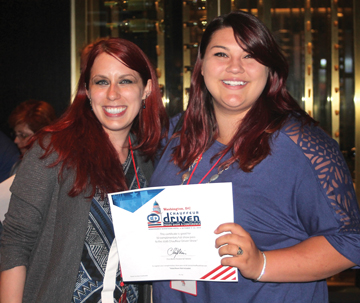 CD Editor Madeleine Maccar (left) with CD Show pass winner Ashley Polk of Fleet Transportation
Two representatives from the Public Service Commission (PSC), the Transportation Division’s Assistant Director of Safety and Enforcement Hilary Hammerman and Director of Transportation Christopher Koermer, capped off the day’s roster of guest speakers. While they both gently reminded those in attendance that they’re bound to the state’s laws—and are often incapable of changing rules that others have put in place—many MLA members see the PSC as bearing considerable responsibility in allowing TNCs to operate and had numerous questions about the commission’s plan to “drive out Uber and other TNCs like they did in Austin.” Both Hammerman and Koermer said that petitioning for fingerprint background checks and temporary operating licenses—which, for many TNCs will expire this December—are immediate solutions to a complex problem.
CD Editor Madeleine Maccar (left) with CD Show pass winner Ashley Polk of Fleet Transportation
Two representatives from the Public Service Commission (PSC), the Transportation Division’s Assistant Director of Safety and Enforcement Hilary Hammerman and Director of Transportation Christopher Koermer, capped off the day’s roster of guest speakers. While they both gently reminded those in attendance that they’re bound to the state’s laws—and are often incapable of changing rules that others have put in place—many MLA members see the PSC as bearing considerable responsibility in allowing TNCs to operate and had numerous questions about the commission’s plan to “drive out Uber and other TNCs like they did in Austin.” Both Hammerman and Koermer said that petitioning for fingerprint background checks and temporary operating licenses—which, for many TNCs will expire this December—are immediate solutions to a complex problem.
Given the recent return of the WMLA and the strengthening of the Virginia Limousine Association, a months-long conversation about unifying the three neighboring organizations continued at the end of the MLA meeting. After the MLA board and members alike brainstormed a number of possible ways to straddle the geographically similar but vast operational difference between the two states and district, it was decided to appoint representatives for each association to form a three-person committee—comprising Jones, George Rains of ZBest Worldwide Chauffeured Transportation Services, and Jeff Shanker of RMA Worldwide Chauffeured Transportation—to facilitate communication and exchanges of information among them.
At the end of the meeting, Maccar raffled off a pass to October’s 2016 Chauffeur Driven Show, which was won by Ashley Polk of Fleet Transportation.
[CD0716]
- Details
- Category: Industry News
 Long Island City, N.Y. — The Black Car Fund (BCF), which provides workers’ injury compensation insurance to approximately 45,000 New York State black car and limousine drivers who are affiliated with BCF member companies, has recently added Amber Alert system driver training to the their Wellness, Safety & Education Program (STEP) classes it provides to those drivers in its Long Island City, Queens Safety and Wellness Center.
Long Island City, N.Y. — The Black Car Fund (BCF), which provides workers’ injury compensation insurance to approximately 45,000 New York State black car and limousine drivers who are affiliated with BCF member companies, has recently added Amber Alert system driver training to the their Wellness, Safety & Education Program (STEP) classes it provides to those drivers in its Long Island City, Queens Safety and Wellness Center.
By offering training in safe observational and reporting methods, BCF hopes that drivers will act as additional eyes and ears to assist the law enforcement community in finding lost and taken children when time is of the essence.
STEP trainers will utilize the Amber Alert System Driver Training presentation guide, prepared and provided by the New York State Police.
New York State Police Superintendent Joseph D’Amico said, “We applaud the Black Car Fund for adding Amber Alert training to the classes they provide. This is an important community service that could help enhance the efforts of law enforcement to locate a missing child when an Amber Alert is issued.”
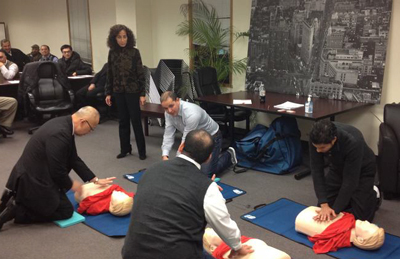 The training enhancement is the brainchild of Black Car Fund Executive Director Ira Goldstein, whose long history with the Amber Alert program dates back to mid-2007 when he introduced Amber Alerts into the yellow taxi fleet system through the new taxi technology systems. While serving as chief of Staff to a former Taxi and Limousine Commission (TLC) chair, Goldstein was recognized in 2010 by the New York State Broadcasters Association and the New York State Amber Alert Partners for “outstanding community service” for his effective advocacy.
The training enhancement is the brainchild of Black Car Fund Executive Director Ira Goldstein, whose long history with the Amber Alert program dates back to mid-2007 when he introduced Amber Alerts into the yellow taxi fleet system through the new taxi technology systems. While serving as chief of Staff to a former Taxi and Limousine Commission (TLC) chair, Goldstein was recognized in 2010 by the New York State Broadcasters Association and the New York State Amber Alert Partners for “outstanding community service” for his effective advocacy.
“Then as now, I’m proud to be involved with the Amber Alert program,” said Goldstein. “When it comes to protecting children – this is the most important public service in which our drivers–or any drivers–can participate.”
BCF’s Amber Alert driver training initiative has earned praise from a multitude of high ranking government officials, including Meera Joshi, TLC Commissioner and Chair, and Ydanis Rodriguez, chairman of the City Council’s Transportation Committee.
“I want to congratulate the BCF for its forward-thinking civic-mindedness in incorporating Amber Alert training into its Safety & Wellness education program,” said Joshi. “The importance of pulling together to protect children could never be overstated.”
"It's great to see the Black Car Fund stepping up as a leader in protecting our city's children,” added Rodriguez. “When a child goes missing, having the eyes and ears of the thousands of drivers affiliated with the BCF at attention will be a boon to concerned parents and residents. I'm pleased that the BCF is starting this initiative as a good corporate citizen and their work should be seen as a model for others to get involved."
Other segments of the STEP class include Healthy Driving, taught by licensed massage therapist Liat Forti; Hands Only CPR, taught by New York Hospital/Weill Cornell’s Heart Institute; and Share the Road, taught by Bike New York. Classes are held each Wednesday and limited to 30 drivers. Participants may attend once yearly for a $150 incentivizing stipend. Reflecting the BCF’s commitment to safety, the center pays drivers an additional $300 for the successful completion of a defensive driving course.
Visit nybcf.org for more information.
[CD0716]
- Details
- Category: Industry News
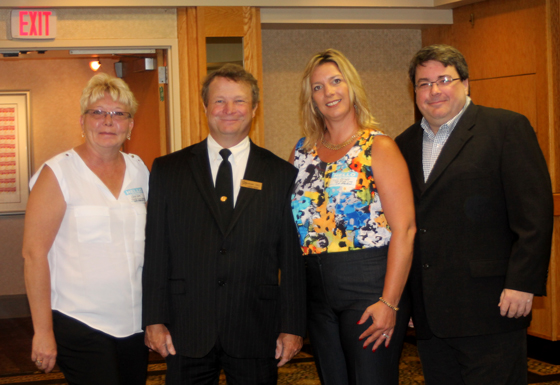 L to R: WLA Secretary/Treasurer Karen Lotts of A Knight Rider Limousine, WLA President Mike Hartmann of Stardust Limousine, Tracy Raimer of Your Private Limousine, and Brian Whitaker of Chicagoland Transportation Solutions
Milwaukee — The Wisconsin Limousine Association (WLA) convened for an in-person meeting at the Clarion Hotel Airport June 26. CD Editor Madeleine Maccar was among the 30 members and supporters on hand for the daylong event that delivered an array of educational presentations amid plenty of networking opportunities.
L to R: WLA Secretary/Treasurer Karen Lotts of A Knight Rider Limousine, WLA President Mike Hartmann of Stardust Limousine, Tracy Raimer of Your Private Limousine, and Brian Whitaker of Chicagoland Transportation Solutions
Milwaukee — The Wisconsin Limousine Association (WLA) convened for an in-person meeting at the Clarion Hotel Airport June 26. CD Editor Madeleine Maccar was among the 30 members and supporters on hand for the daylong event that delivered an array of educational presentations amid plenty of networking opportunities.
After President Mike Hartmann of Stardust Limousines kicked off the meeting, he got right down to business by presenting WLA’s reasons for wanting the state’s 5-percent fee eliminated, which has been a thorn in the Wisconsin livery industry’s side for years. The fee is paid on any SUV that can accommodate up to 10 passengers and is only imposed upon our industry, as taxis, buses, and, of course, TNCs are not required to pay that same 5 percent. And especially in instances where road conditions require an upgrade from a sedan to a safer, higher-occupancy vehicle, the rule can create extra headaches and work for operators.
“It’s a major problem because you open yourself up to an audit with all the paperwork that goes with the fee,” Hartmann said. “We had one senator try to get it eliminated, but that didn’t help. We have to stand up or our taxes are going to snowball.”
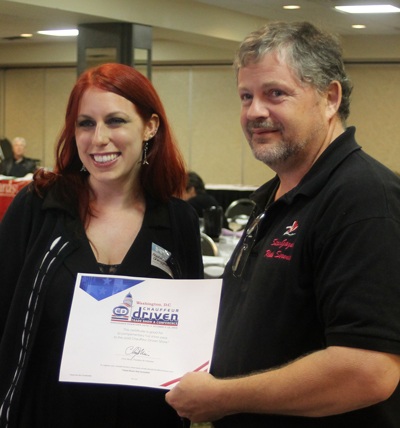 CD Editor Madeleine Maccar with Rich Linzmeier of StarGazer Limousine, who won a pass to the Chauffeur Driven 2016 Show in Washington, D.C.
Gary Goyke, WLA’s lobbyist and a former senator, was the first guest speaker of the day and offered a little bit of insight into the 5-percent fee, explaining that it would be difficult to repeal because it was introduced as part of package that would benefit from “every vehicle putting a nickel or a dime into paying for the roads.”
CD Editor Madeleine Maccar with Rich Linzmeier of StarGazer Limousine, who won a pass to the Chauffeur Driven 2016 Show in Washington, D.C.
Gary Goyke, WLA’s lobbyist and a former senator, was the first guest speaker of the day and offered a little bit of insight into the 5-percent fee, explaining that it would be difficult to repeal because it was introduced as part of package that would benefit from “every vehicle putting a nickel or a dime into paying for the roads.”
“It’s a very tough time for Wisconsin transportation right now,” he added. “There’s very little money in transportation’s coffers.”
He went on to explain how TNCs, especially Uber, operate in order to get so much done to their benefit—and behind the scenes in strategically selected areas where commercial transportation rules are vague enough so that any battle waged against the disruptors is “pretty much over as soon as it begins.”
“Their mode of operation is to work out of sight: no public notices, no above-board work, no public hearings,” said Goyke. “So when something like a hearing or schedule for passage is suddenly announced, we’re scrambling to get our people together while they already have theirs all lined up and ready to testify.”
Goyke went on to encourage all in attendance to become more proactive in or at least more knowledgeable of local and statewide government, especially in regard to identifying the elected officials who have thrown their support behind TNCs rather than homegrown and locally active services: “This is now part of your job as small-business owners. You have the leverage to stop them from getting re-elected.”
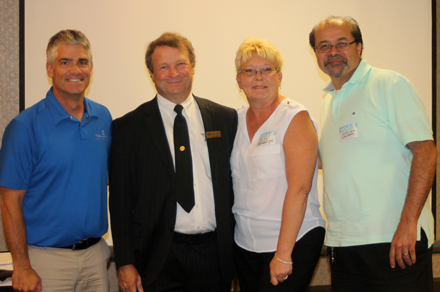 L to R: WLA members Rich Coffren of Telin Transportation Group, President Mike Hartmann of Stardust Limousine, Secretary/Treasurer Karen Lotts of A Knight Rider Limousine, and Samer Abulughod of Crystal Limousine & Coach.
In a show of regional solidarity, representatives from the Illinois Limousine Association (ILA)—President Tracy Raimer of Your Private Limousine, Vice President Brian Whitaker of Chicagoland Transportation Solutions, and Secretary/Treasurer Paula DiBiasi of Chicago Coachworks—were on hand, and both Wisconsin native Raimer and Whitaker spoke about the legislative and regulatory woes that WLA’s neighbors to the south have been facing for nearly four years, offering up their experiences and insights in the hopes of helping operators in one of the TNCs’ newest battlegrounds.
L to R: WLA members Rich Coffren of Telin Transportation Group, President Mike Hartmann of Stardust Limousine, Secretary/Treasurer Karen Lotts of A Knight Rider Limousine, and Samer Abulughod of Crystal Limousine & Coach.
In a show of regional solidarity, representatives from the Illinois Limousine Association (ILA)—President Tracy Raimer of Your Private Limousine, Vice President Brian Whitaker of Chicagoland Transportation Solutions, and Secretary/Treasurer Paula DiBiasi of Chicago Coachworks—were on hand, and both Wisconsin native Raimer and Whitaker spoke about the legislative and regulatory woes that WLA’s neighbors to the south have been facing for nearly four years, offering up their experiences and insights in the hopes of helping operators in one of the TNCs’ newest battlegrounds.
Most recently, members of the ILA have filed a lawsuit against Chicago for showing preferential treatment to TNCs, which has been an ongoing process punctuated by testimonies, hearings, small victories, and big headaches—including representatives from the state beyond its Chicago suburbs admitting that they generally vote in favor of TNCs without fully understanding the issue and “because that’s how Chicago voted.”
Raimer urged those in attendance to read through Uber’s terms of service, drawing particular attention to its refusal of lability in the event of passenger injury or even death. She and Whitaker also highlighted how any kind of enforcement that would level the playing field at Chicago’s airports was lax at best, how TNCs aren’t paying the same airport fees as legally operating services are but are still winning over public favor, and how operators need to beef up their technological components to be a viable player in the transportation game these days—and how the technology suppliers in the industry need to start working together so operators can, too.
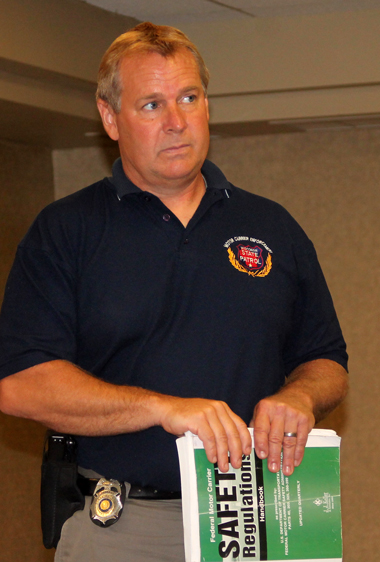 Guest Speaker Sgt. Mark Abrahamson of Wisconsin State Patrol takes a question during his presentation
“We did need that technology shakeup that the disruptors brought but we will never again see the same industry we operated in five years ago,” Raimer said. “When TNCs first came to our market, we feared that we’d lose our relationship with the city of Chicago so we didn’t stick up for our industry—that was a huge mistake. We’re in survival mode now.”
Guest Speaker Sgt. Mark Abrahamson of Wisconsin State Patrol takes a question during his presentation
“We did need that technology shakeup that the disruptors brought but we will never again see the same industry we operated in five years ago,” Raimer said. “When TNCs first came to our market, we feared that we’d lose our relationship with the city of Chicago so we didn’t stick up for our industry—that was a huge mistake. We’re in survival mode now.”
Sgt. Mark Abrahamson of Wisconsin State Patrol then spoke about the state’s DOT regulations and enforcement, covering recent efforts to increase on-the-road safety and education on both a statewide and national level. While compliance with both DOT and FMCSA regulations were discussed at great length, Abrahamson also covered the differences between interstate and intrastate compliance, what constitutes a commercial motor vehicle in the legal sense, and how passenger capacity determines the applicability of each law governing the industry.
Since much of what Abrahamson covered have been thorny issues for Wisconsin operators, he also provided detailed lists about concerns like critical and acute violations of drug and alcohol policies, as well as safety audits and a flowchart and series of questions about both inter- and intrastate passenger-carrying vehicles, which can be accessed at goo.gl/IRCuJn.
Maccar closed out the speaker schedule for the day, discussing how Chauffeur Driven aims to assist the industry both in print and with its annual events. She also raffled off a pass to October’s CD Show in Washington, D.C., which was won by Rich Linzmeier of StarGazer Limousine.
The next WLA meeting will be its monthly conference call, scheduled for July 20.
Visit wisconsinlimo.org for more information.
[CD0716]

